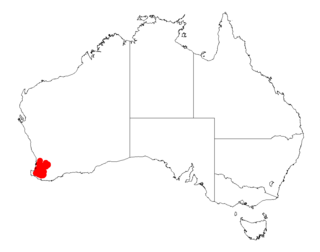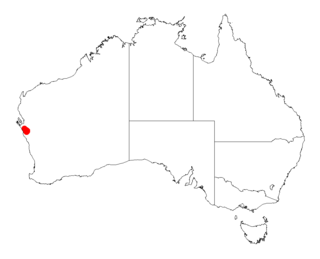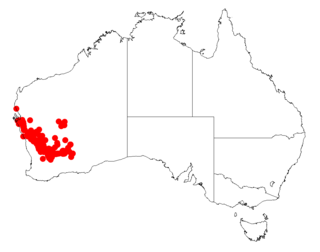
Acacia chrysochaeta is a shrub belonging to the genus Acacia and the subgenus Juliflorae that is endemic to a small area of north western Australia.
Acacia stanleyi, commonly known as Stanley's rock wattle, is a shrub belonging to the genus Acacia and the subgenus Juliflorae that is endemic to south western Australia.

Acacia acuaria is a shrub belonging to the genus Acacia and the subgenus Phyllodineae that is endemic to Western Australia.

Acacia barbinervis is a shrub belonging to the genus Acacia and the subgenus Phyllodineae endemic to Western Australia.

Acacia clydonophora is a shrub belonging to the genus Acacia and the subgenus Phyllodineae that is endemic to Western Australia.

Acacia crassiuscula is a shrub belonging to the genus Acacia and the subgenus Phyllodineae found along the south coast of Western Australia.

Acacia glutinosissima is a shrub belonging to the genus Acacia and the subgenus Phyllodineae that is endemic to western Australia.

Acacia hystrix is a shrub belonging to the genus Acacia and the subgenus Phyllodineae that is endemic to south western Australia.

Acacia insolita is a shrub belonging to the genus Acacia and the subgenus Phyllodineae that is endemic to south western Australia.

Acacia mutabilis is a shrub belonging to the genus Acacia and the subgenus Phyllodineae that is endemic to south western Australia.

Acacia pachyphylla is a shrub belonging to the genus Acacia and the subgenus Phyllodineae that is endemic to south western Australia.

Acacia pachypoda is a shrub belonging to the genus Acacia and the subgenus Phyllodineae that is endemic to south western Australia.

Acacia plautella is a shrub belonging to the genus Acacia and the subgenus Phyllodineae that is endemic to a small area along the coast of western Australia.

Acacia saxatilis is a shrub of the genus Acacia and the subgenus Phyllodineae that is endemic to south western Australia

Acacia scirpifolia is a shrub or tree of the genus Acacia and the subgenus Phyllodineae that is endemic to western Australia

Acacia sphacelata is a shrub of the genus Acacia and the subgenus Phyllodineae that is endemic to south western Australia.

Acacia longispinea is a shrub or tree of the genus Acacia and the subgenus Plurinerves that is endemic to an area of south western Australia.

Acacia conferta, commonly known as crowded-leaf wattle, is a shrub belonging to the genus Acacia and the subgenus Phyllodineae that is endemic to eastern Australia.

Acacia quadrilateralis is a shrub belonging to the genus Acacia and the subgenus Phyllodineae native to north eastern Australia.

Acacia rhigiophylla, commonly known as dagger-leaf wattle, is a shrub belonging to the genus Acacia and the subgenus Juliflorae that is native to southern Australia.


















